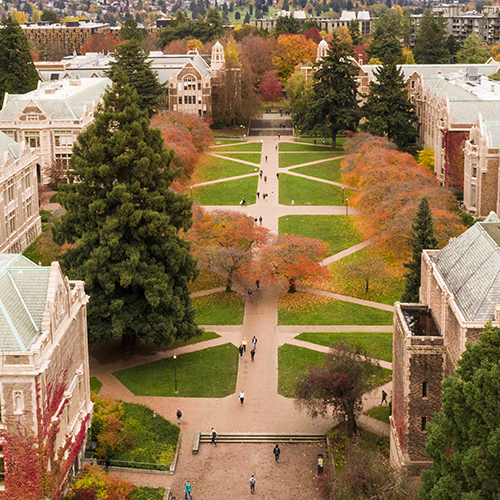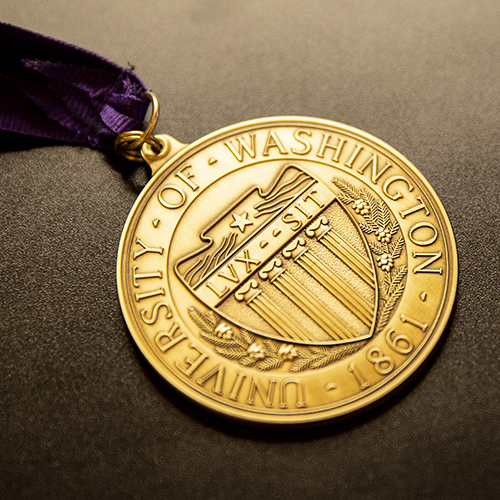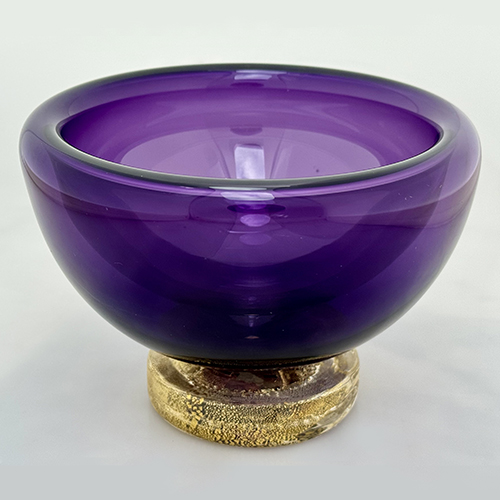Mexican Scandals Explored in "Outstanding Book"
In her book Citizens of Scandal: Journalism, Secrecy, and the Politics of Reckoning in Mexico, Vanessa Freije explores the causes and consequences of political scandals in Mexico from the 1960s through 1980s. Freije, assistant professor in the Jackson School of International Studies, recently won the American Historical Association’s Eugenia M. Palmegiano Prize, which recognizes “the most outstanding book published in English on any aspect of the history of journalism.”

Freije specializes in the history of Mexico and intra-American relations, the politics of knowledge production, and the role of journalists in a country’s democratic change. Her book focuses on a period when Mexico’s one party, the Institutional Revolutionary Party, was undergoing significant changes and feeling domestic and international pressure to become more democratic. The print media increasingly covered scandalous state wrongdoing, from public embezzlement to illegal torture and electoral fraud.
“In the book, I am interested in understanding the consequences of putting such accusations in print, or of making them public,” says Freije. “Mexican readers were not surprised that political leaders were engaged in these activities, but scandals were nonetheless transformative because they made the open secret of state wrongdoing a central topic of debate.”
Asked how current journalism in Mexico differs from that period, Freije says that the Mexican press is now professionalized, and also more reliant on private advertising, making journalists more willing to report on government wrongdoing but also more wary of business interests. Most important, journalism is far deadlier under today’s electoral democracy than it was under one-party rule.
“Mexico is now one of the most dangerous places in the world to be a journalist, as drug trafficking organizations and their government collaborators attack or murder reporters who threaten their interests,” Freije says.
$25 Million for Optoelectronic Device Research
The National Science Foundation (NSF) is funding a new endeavor to bring atomic-level precision to the devices and technologies that underpin much of modern life and to transform fields like information technology in the decades to come. A five-year, $25 million NSF Science and Technology Center grant will found the Center for Integration of Modern Optoelectronic Materials on Demand (IMOD), a collaboration of scientists and engineers at 11 universities, led by the UW’s David Ginger as IMOD director.

IMOD research will center on new semiconductor materials and scalable manufacturing processes for new optoelectronic devices, for applications ranging from displays and sensors to a technological revolution — under development today — that will harness the principles of quantum mechanics.
“In the early days of electronics, a computer would fill an entire room. Now we all carry around smartphones that are millions of times more powerful in our pockets,” says Ginger, the Alvin L. and Verla R. Kwiram Endowed Professor of Chemistry, chief scientist at the UW Clean Energy Institute and co-director of NW IMPACT. “Today, we see an opportunity for advances in materials and scalable manufacturing to do the same thing for optoelectronics: Can we take a quantum optics experiment that fills an entire room, and fit thousands — or even millions — of them on a chip, enabling a new revolution? Along the way we anticipate IMOD’s science will help with a few more familiar challenges, like improving the display of the cell phone you already have in your pocket so the battery lasts longer.”
To realize this future, present-day research must develop new materials, and new strategies to manufacture them. That’s where IMOD comes in, Ginger says. Building on advances in the synthesis of semiconductor quantum dots and halide perovskites, the center will integrate the work of scientists and engineers from diverse backgrounds, including chemists, materials scientists, mechanical engineers, electrical engineers, and physicists. UW faculty involved in this work include Brandi Cossairt (Chemistry), Kai-Mei Fu (Physics, Electrical and Computer Engineering), Devin MacKenzie (Mechanical Engineering, Materials Science and Engineering), Arka Majumdar (Physics, Electrical and Computer Engineering), Daniel Gamelin (Chemistry), and Ginger.
UW Botanists Honored
Two UW botanists with key roles at the University of Washington Herbarium were honored this year by the Washington Native Plant Society (WNPS). Both were named Arthur R. Kruckeberg Fellows — the highest accolade given to a WNPS member. The honor is named after WNPS founder Art Kruckeberg, UW professor of botany from 1950 to about 1990.

Richard Olmstead, professor of biology and curator of the Herbarium, was honored for his contributions to teaching plant systematics, co-editing the 2nd Edition of Flora of the Pacific Northwest — an update of the original book published in 1973 by C. Leo Hitchcock and Arthur Cronquist — and promoting outreach to the community of amateur native plant botanists in Washington state through the Herbarium.
David Giblin, Herbarium Collections Manager and Research Botanist at the Burke Museum was honored as lead editor and co-author of the 2nd Edition of Flora of the Pacific Northwest, offering botanical workshops and leading field trips for professional and amateur botanists across Washington, and coordinating the development of an online database for the 700+ plant lists that WNPS maintains.
"We are truly honored to be recognized in this way by WNPS," says Giblin. "We are fortunate that we have had so many opportunities over the years to partner with WNPS on topics including educational outreach, citizen science, conservation, and overall appreciation for Washington's flora."
The University of Washington Herbarium — part of the Burke Museum — includes more than 700,000 plant specimens, with 5,000-10,000 new specimens added annually. It maintains a regional focus on the Pacific Northwest but also includes significant collections from California, the rest of western North America, and the Pacific Rim. The oldest specimens date to the mid 1800s.
Other Awards, Honors & Professorships
Professorships (New Appointments)
Honorary Awards
Zack Almquist, assistant professor of sociology, was named the 2021 winner of the American Sociological Association Methodology Section’s Leo Goodman Award for Early Career Scholars. This award, presented in alternate years, was created in 2005 to honor an outstanding researcher within 15 years of their PhD.
Brandi Cossairt, Lloyd E. and Florence M. West Endowed Professor of Chemistry, was elected to the Washington State Academy of Sciences (WSAS), recognizing her outstanding record of scientific and technical achievement. WSAS is an independent nonprofit established by the Washington State Legislature to respond to scientific and technical questions to inform public policy. Other new WSAS members from the Department of Chemistry were noted in a previous issue of Perspectives newsletter.
Andrew Geist, education officer for the Aerospace Studies Department (Air Force ROTC), won the Northwest Region Field Grade Officer of the Quarter Award.
Ralina Joseph, professor of communication, has received the Barclay Simpson Prize for Scholarship in Public from the UW Simpson Center for the Humanities, for her work on projects such as Interrupting Privilege, an intergenerational, skills-building, and anti-racist space for dialogue and critique. Joseph is director of the UW Center for Communication, Difference, and Equity and is associate dean for Diversity and Student Affairs in The Graduate School.
Stephanie Kerschbaum, associate professor of English, received the 2021 Lisa Ede Mentoring Award from the Coalition of Feminist Scholars in the History of Rhetoric and Composition. The biennial award recognizes an individual or group with a career-record of mentorship, including formal and informal advising of students and colleagues; leadership in campus, professional, and/or local communities; and other activities that align with the overall mission and goals of the Coalition, guided by a feminist ethos of caring and care.
Adrian K. C. Lee, professor and chair of the Department of Speech and Hearing Sciences, has been elected a Fellow in the Acoustical Society of America, a member society of the American Institute of Physics. The honor recognizes Lee’s contributions to our understanding of auditory attention.
Xiaosong Li, professor of chemistry, was elected as a Fellow of the American Physical Society. He was nominated by the Division of Chemical Physics “for seminal contributions to the development and application of time-dependent quantum theory and relativistic electronic structure theory.”
Lieutenant Megan C. Lum, assistant professor of naval science, received a Navy and Marine Corps Commendation Medal for meritorious service while serving as an academic adviser to students in the UW Naval Reserve Officers Training Corps Unit.
Izumi Matsuda-Kiami, teaching professor of Japanese, won the Inspirational Leadership Award from the Washington Association for Language Teaching (WAFLT), presented to “a person or persons selected by the WAFLT board who has demonstrated leadership and inspiration to others in the world language fields. This certificate recognizes important contributions in promoting, organizing, supporting, defending, lobbying, or planning some important aspect of study of world languages and/or cultures.”
Anne B. McCoy, Natt-Lingafelter Professor of Chemistry, received the Francis P. Garvan-John M. Olin Medal from the National American Chemical Society, which recognizes distinguished service to chemistry by women chemists.
Jesus Ramirez, HR manager for the Aerospace Studies Department (Air Force ROTC), won the Air University HR Manager of the Quarter Award.
Richard Wright, professor and chair of the Department of Linguistics, has been elected a Fellow in the Acoustical Society of America, a member society of the American Institute of Physics. The honor recognizes Wright’s contributions to understanding how phonetic variability impacts communication.
Publication Awards
Paul Atkins, professor of Asian languages and literature, was awarded the 2021 Kyoko Selden Memorial Translation Prize, administered by Cornell University, for Excerpts from Shōkenkō 蕉堅稿: The Selected Poems of Zekkai Chūshin 絶海中津 (1336-1405). The selection committee noted that translation of these texts into English, along with the transcriptional work that accompanied them, constitutes both a prodigious scholarly effort and a milestone in studies of this genre and period.
Peter Catron, assistant professor of sociology, won the Louis Wirth Best Article Award from the American Sociological Association’s Migration Section for his American Journal of Sociology article, “The Citizenship Advantage.” Drawing on new linked census data and a clever research design, Catron analyzed how naturalization policies during the early 20th century influenced the economic success of Southern and Eastern European immigrants across generations.
Catherine Cole, divisional dean of arts and professor of English, was awarded an honorable mention for the Dance Studies Association's de la Torre Bueno Prize, for her book, Performance and the Afterlives of Injustice. The de la Torre Bueno Prize is awarded annually to a book published in the English language that advances the field of dance studies.
Stephanie Kerschbaum, associate professor of English, and her co-author Lauren Rosenberg (University of Texas at El Paso) have received the 2021 National Council of Teachers of English (NCTE) Richard C. Ohmann Award for their article, “Entanglements of Literacy Studies and Disability Studies,” published in the March 2021 issue of College English. The award recognizes an outstanding refereed article in the past volume year that makes the most significant contribution to scholarship or research, or theory or pedagogy, in English studies.
Arzoo Osanloo, professor of law, societies & justice and director of the UW Middle East Center, has received two honorable mentions for her 2020 book, Forgiveness Work: Mercy, Law, and Victim's Rights in Iran — an honorable mention for the 2021 Association for Political and Legal Anthropology (APLA) Book Prize in Critical Anthropology, and another for the 2021 Clifford Geertz Prize in the Anthropology of Religion.
Sarah Quinn, associate professor of sociology, received recognition for her book American Bonds: How Credit Markets Shaped a Nation, named the Best Book in Economic Sociology and Political Economy from economicsociology.org. The book investigates the effect of political institutions on mortgage markets.
Anu Taranath, teaching professor of English, continues to earn recognition for her book, Beyond Guilt Trips: Mindful Travel in an Unequal World. The latest is the Newsweek Future of Travel Award in the Storytelling category.
Professorships (New Appointments)
Kemi Adeyemi, assistant professor of gender, women and sexuality studies and director of the Black Embodiments Studio, was appointed to the Donald E. Petersen Endowed Professorship.
Marie Anchordoguy, professor in the Jackson School of International Studies and chair of the Japan studies program, was appointed to the Long Endowed Professorship.
Anis Bawarshi, professor and chair of the Department of English, was appointed to the Thomas L. & Margo G. Wyckoff Endowed Faculty Fellowship.
Arbella Bet-Shlimon, associate professor of history, was appointed to the Joff Hanauer Endowed Faculty Fellowship in History.
Kathryn Bunn-Marcuse, associate professor of art history, curator of Northwest Native art, and director of the Bill Holm Center at the Burke Museum, was appointed to the Bill Holm Center Endowed Professorship.
Andy Connolly, associate vice provost for data science, professor of astronomy, and director of the eScience Institute, was appointed to the William P. and Ruth Gerberding University Professorship.
Bianca Dang, assistant professor of history, was appointed to the Donald W. Logan Family Endowed Chair in American History.
Marilena Loverde, associate professor of physics, was appointed to the Dr. Ann Nelson Endowed Professorship in Physics.
Tony Lucero, associate professor in the Jackson School of International Studies, was appointed to the H. Stewart Parker Endowed Faculty Fellowship.
Devin E. Naar, associate professor of history, faculty at the Stroum Center for Jewish Studies in the Jackson School of International Studies, and Sephardic studies program chair, was appointed to the Isaac Alhadeff Professorship in Sephardic Studies.
Scott Radnitz, associate professor in the Jackson School of International Studies and director of the Ellison Center for Russian, Eastern European, and Central Asian Studies, was appointed to the Herbert J. Ellison Professorship for Russian and Eurasian Studies.
Mark Rudner, associate professor of physics, was appointed to the Kenneth K. Young Memorial Endowed Chair in Physics.
Stephanie Smallwood, associate professor of history and comparative history of ideas, was appointed to the Dio Richardson Endowed Professorship in History.
Katherine Stovel, professor and chair of sociology, was appointed to the Clarence and Elissa M. Schrag Endowed Faculty Fellowship.
Lynn M. Thomas, professor of history, was appointed to the Giovanni and Amne Costigan Endowed Professorship in History.
Clara Wilkins, associate professor of psychology, was appointed to the Earl R. Carlson Endowed Professorship.
Bobby L. E. Wilson, assistant professor of mathematics, was appointed to the John Rainwater Endowed Fellowship.
Shawn Wong, professor of English, was appointed to the Byron W. and Alice L. Lockwood Professorship in the Humanities.
Other Awards & Honors
Jayadev Athreya, professor of mathematics and comparative history of ideas, has been appointed interim director of the Pacific Institute for the Mathematical Sciences, a consortium of universities and community of mathematical scientists that promotes research, applications, training, partnerships, and awareness of the mathematical sciences.
Shih-Chieh Hsu, associate professor of physics, will lead a new Accelerated AI Algorithms for Data-Driven Discovery Institute (A3D3 Institute), a partnership of nine universities led by the UW, through a $15 million, five-year grant. The Institute aims to provide new paradigm-shifting AI tools for analyzing the types of large and complex datasets that are an increasingly common feature of research. Other UW faculty involved with the Institute are Scott Hauck (Electrical and Computer Engineering). Amy Orsborn (Bioengineering and Electrical and Computer Engineering), and Eli Shlizerman (Applied Mathematics and Electrical and Computer Engineering).
J. Nathan Kutz, professor of applied mathematics, will lead the UW’s AI Institute for Dynamic Systems, one of 11 new artificial-intelligence research institutes funded by the National Science Foundation. With about $20 million in funding over five years, the Institute will focus on fundamental AI and machine learning theory, algorithms and applications for real-time learning and control of complex dynamic systems. Steve Brunton, associate professor of mechanical engineering, is the Institute’s associate director.
Julie Stein, director of the Burke Museum and professor of anthropology, has been honored by the Society of American Archaeology (SAA) by having the SAA’s Geoarchaeology Interest Group undergraduate student award named after Stein. The award will now be known as the “Julie K. Stein Undergraduate Student Award,” to be given to an undergraduate presenting at the SAA annual meeting.
Peter Ward, professor of biology, was awarded a two-year honorary membership to the Rainier Club as an at-large member, in honor of his scientific accomplishments. Normally these awards have gone to politicians or famous artists of the Seattle area — the previous “class” included Christine Gregoire and Dale Chihuly. Ward is the first UW scientist to be awarded this honor.
Hamza Zafer, associate professor of Near Eastern languages and civilization, is a Fellow at the Herbert D. Katz Center for Advanced Judaic Studies at the University of Pennsylvania during Autumn Quarter 2021 and Winter Quarter 2022. The theme of study for the Center is "Jews and the Law: Rethinking Premodern Jewish Legal Cultures."
More Stories

Awards for Research, Social Justice Efforts & More
Recent awards celebrate Arts & Sciences faculty, staff, and alumni for their research, social justice work, lifetime achievements, and more.

2025 UW Awards of Excellence
Arts & Science faculty and staff were among the recipients of 2025 UW Awards of Excellence for their teaching, leadership, and innovation.

A Handcrafted Award for Medalists
Each of the College's 2025 medalists received a special gift — a glass bowl, handblown in the UW School of Art + Art History + Design.